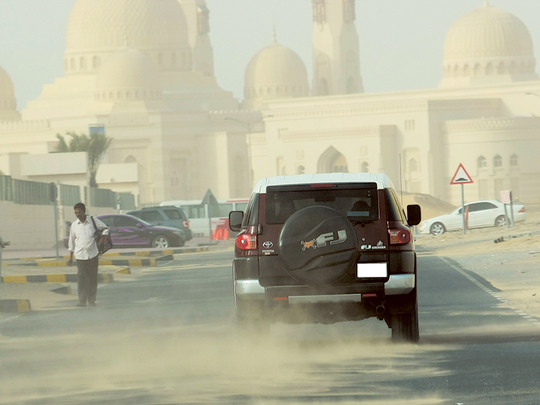
Predictions of dust storms and winds at speeds exceeding 55km/hour for the UAE were given out on Thursday by the National Centre of Meteorology (NCM). Apart from low visibility and therefore, higher risk while driving, there are also health risks associated with being out during sand storms.
"I have already had three patients come in complaining of allergic rhinitis today", said Dr. Sanjay Kewalramani, Specialist ENT Surgeon at Medcare Hospital in Sharjah. Allergic rhinitis, also called hay fever, is a common condition which leads to inflammation in the nasal canals due to allergens in the air.
"Sandstorms are the worst for people who suffer from allergic rhinitis or those who're prone to allergies. Apart from the dust and sand, the storms also carry allergens such as plants, fungi and grass pollen leading to a higher rate of allergies all around", Dr. Kewalramani said.
People who have weak immune systems, due to recent illnesses, age, surgeries or because of medications, are at high risk of bacterial or viral infections as well. This includes young children and older residents.
But I've never had an allergy...
Dr. Bhavin K. Sampat, Specialist Pulmonologist at Zulekha Hospital Sharjah said, "People who haven't had allergies are also prone to respiratory conditions, especially if they've been exposed to heavy sand storms."
He also reiterated that while asthma sufferers and young children are the most prone to getting sick, anyone with excessive coughing, running nose or wheezing should consult their doctor immediately.
How do I know if I am allergic?
There's a test to find out what substances you may be allergic to. It is called the 'skin prick allergy test' which involves a small dose of allergens being injected in to your system to analyse reactions. So, if you feel like you are having an allergy, get tested and find out exactly what you may be reacting to.
What can I do?
If you are allergic or are worried that you're at risk of allergies, staying indoors is your best precaution.
Dr. Sampat said, "People prone to respiratory conditions should keep an eye on sandstorm predictions and the intensity. While face masks could help reduce the effects, the only way to make sure you don't fall sick is to avoid stepping out during heavy sand storms."
However, if you do need to go out, cover your eyes, nose and mouth effectively. "Stay away from indoor parking spaces as well, as the sand and allergens can get recirculated in there", Dr. Kewalramani said.











